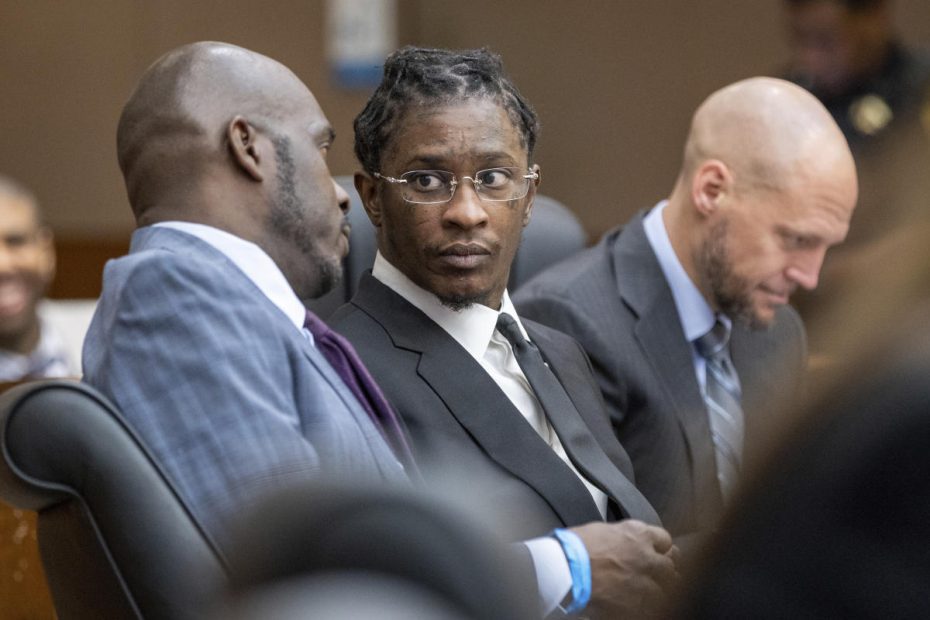ATLANTA (AP) — The judge overseeing the long-running racketeering and gang prosecution against Young villain and others was taken off the case after two defendants requested his recusal, citing a meeting the judge had with prosecutors and a state witness.
Fulton County Chief Judge Ural Glanville had adjourned the case in Atlanta two weeks ago to give another judge a chance to consider the defendants' motions for recusal. Judge Rachel Krause granted those motions Monday and ordered the court clerk to reassign the case to another judge.
While she did not fault Glanville for holding the meeting and said she has “no doubt that Judge Glanville can and will continue to preach honestly on this matter,” Krause wrote that “the 'need to maintain public confidence in the justice system' militates in favor of exonerating Judge Glanville” from the case.
The ruling will certainly lead to more delays in a trial that has already lasted more than a year. Jury selection began in January 2023 and lasted nearly 10 months. Opening statements were in November, and the prosecution has since presented its case and called dozens of witnesses.
Young Thug, a Grammy winner whose given name is Jeffery Williams, was indicted two years ago in a wide-ranging indictment accusing him and more than two dozen others of conspiring to violate Georgia's anti-racketeering law. He also faces gang, drug and weapons charges and is on trial with five of the others charged with him.
Attorneys for Young Thug and co-defendant Deamonte Kendrick filed motions seeking Glanville's recusal. They said the judge held a meeting with prosecutors and prosecution witness Kenneth Copeland that the defendants and defense attorneys were not present. Defense attorneys argued the meeting was “inappropriate” and that the judge and prosecutors attempted to pressure the witness into testifying.
Glanville continued to insist that the meeting was official and that no one gained a tactical advantage from it.
The office of Fulton County District Attorney Fani Willis, which is prosecuting the case, argued there was no reason to rescind Glanville.
The Associated Press has contacted Glanville and an attorney for Young Thug for comment on Monday's ruling. A spokesman for Willis' office declined to comment.
“While I respect Chief Judge Glanville and his service to this community and the country, he has simply become biased over the course of this case,” Kendrick’s attorney, Doug Weinstein, said in an email. He added that he looks forward to trying the case “before an impartial judge” but said the only fair outcome at this time is “a mistrial and bail” for Kendrick, who has been in prison for more than two years.
Krause wrote in her order that she “generally” agrees with Glanville's assessment of the meeting's propriety, that there was nothing inherently improper about the meeting or what was discussed. She did write that the meeting “could — and perhaps should — have been held in open court.
But when Glanville denied Kendrick's request for recusal in court, “he provided context, questioned the accuracy of the allegations, and otherwise explained his decisions and actions and argued why those actions were appropriate.” Citing case law, Krause wrote that when a judge discloses information relevant to his potential recusal, he must do so “in a manner that is as objective, impartial, and nonargumentative as possible so that the judge is not reasonably perceived as a hostile witness or advocate.”
Young Thug has enjoyed enormous success since he began rapping as a teenager and is the CEO of his own record label, Young Stoner Life, or YSL. Artists on his label are considered part of the “Slime Family” and a compilation album, “Slime Language 2,” reached No. 1 on the charts in April 2021.
But prosecutors say YSL also stands for Young Slime Life, which they allege is a violent Atlanta-based street gang affiliated with the national Bloods gang and founded in 2012 by Young Thug and two others. Prosecutors say the people named in the indictment committed violent crimes — including murders, shootings and carjackings — to raise money for the gang, burnish its reputation and expand its power and territory.
Young Thug's attorney Brian Steel acknowledged during his opening statement that his client's songs depict violent acts, including murder, but said they are merely artistic expressions of his troubled childhood and not a chronicle of his own activities.

